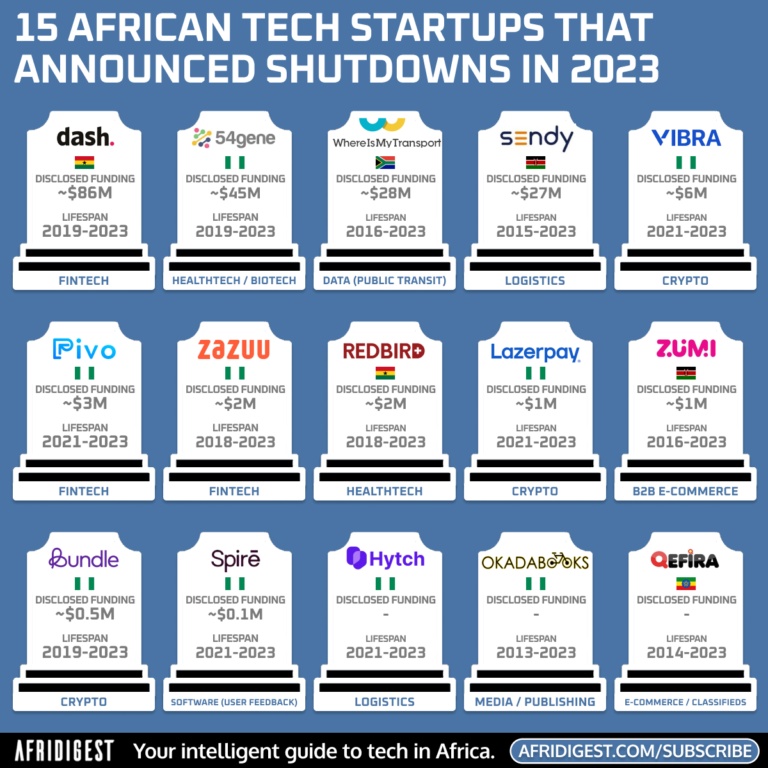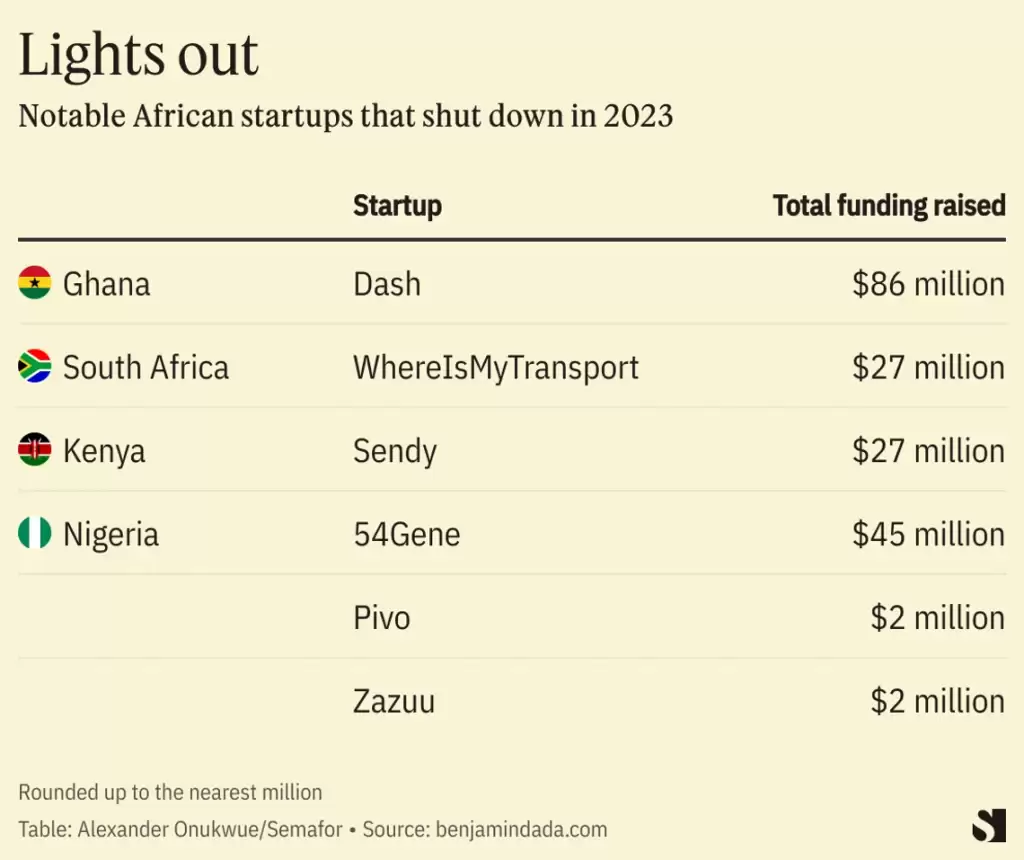Why African Startups Failed In 2023
The year 2023 presented a challenging landscape for startups across Africa, with financial difficulties triggering closures and disruptions. Notably, Nigeria, often celebrated as a hub for innovation, found itself at the forefront of this narrative, experiencing a wave of closures that raised concerns about the overall health of its entrepreneurial ecosystem.
Notably, Sendy, an end-to-end fulfillment startup in Kenya, halted its operations in August due to reduced order volumes and soaring fuel prices. Despite having raised $20 million in January 2020, the company couldn’t secure additional funding in the challenging economic climate.
Similarly, Dash, a Ghanaian payments startup founded in 2019, with a substantial $86 million in previous funding, folded in October amid allegations of financial impropriety and false reporting.
Meanwhile, South African mobility startup WhereIsMyTransport, despite receiving over $27 million in funding, announced its closure in October after failing to secure additional investment.
In Kenya, Zumi, a B2B e-commerce startup, shut down in March despite achieving over $20 million in sales and acquiring 5,000 customers. The challenging fundraising environment proved insurmountable for Zumi, leading to its closure and highlighting the broader difficulties faced by startups in securing necessary funding.

As the financial landscape poses challenges for startups across the African continent, the stories of closures extend beyond borders. These instances underscore the pervasive difficulties in securing additional funding, regardless of previous successes or substantial investments. From Kenya to Ghana and South Africa, startups are grappling with the complexities of sustaining operations in a challenging economic climate, further emphasizing the shared struggles faced by entrepreneurs throughout the region.
While the aforementioned closures represent just a snapshot of the challenges faced by startups across Africa in 2023, it is noteworthy that Nigeria, often hailed as the giant of Africa, took center stage in this narrative.
Surprisingly, more than half of the startups in the list of closures hail from Nigeria, showcasing the magnitude of the impact within the Nigerian startup ecosystem. The difficulties experienced by these startups, ranging from financial constraints to the inability to secure additional funding, echoed a broader trend within the Nigerian entrepreneurial landscape.
How Big Was The Problem In Nigeria?
- Nigeria’s Role in the African Startup Ecosystem
Nigeria has been a key player in the African startup ecosystem, often regarded as a hub for innovation and entrepreneurial endeavors. However, the year 2023 witnessed a troubling trend with Nigeria leading in startup shutdowns, raising concerns about the challenges faced by businesses in the country. The problem in Nigeria was so huge, that on a daily basis, news of startups about to close operations or been acquired by another pops up. Nigerians almost everyday woke up to such news in 2023.
The increasing number of startups shutting down operations in Nigeria is a red flag for the overall health of the entrepreneurial landscape. This article delves further into the specific economic, regulatory, and market dynamics contributing to this trend.
Why Did Startups Shut Down In Nigeria?
There are a few key reasons for why many businesses in Nigeria closed down in 2023. First, the value of money in Nigeria is not stable, which makes it more expensive for businesses, especially those dealing with other countries. Also, prices are going up, and people can’t buy as much, making it hard for businesses to sell their products at affordable prices.
Second, the rules and regulations for businesses in Nigeria are complicated. This makes it tough for startups to understand and follow the laws, leading to legal problems and delays in getting necessary permissions.
Third, getting money to start or keep a business running is hard in Nigeria. There isn’t enough investment money, and loans come with high-interest rates, making it difficult for startups to grow.

Lastly, the competition is tough, especially in areas where there are already a lot of similar businesses. Standout is hard, and changing customer preferences make it challenging for startups to keep up.
In short, the shutdown of many startups in Nigeria is due to problems with money, lack of funding, and strong competition. Fixing these issues is crucial to help businesses succeed in Nigeria.
How Is This Unhealthy For The African Startups Ecosystem?
The increasing shutdown of startups in Nigeria has adverse effects on the broader African startup ecosystem. This trend diminishes innovation and diversity within the market, erodes investor confidence, and leads to a drain of talent as individuals lose their jobs. The negative perception resulting from frequent closures may deter potential entrepreneurs and investors, while the reduced economic impact hampers the overall development of the region. Moreover, persistent closures can stifle the entrepreneurial spirit and limit opportunities for collaboration among startups. Ultimately, the shutdowns not only impact individual businesses but also weaken the resilience and growth potential of the entire African startup ecosystem. Addressing these challenges is crucial to fostering a vibrant and sustainable environment for entrepreneurship across the continent.
Catch Up On This Story: ‘Bad Market Everywhere’ This Festive Season, As Nigerians And Startups Lament.
What Top Startups Did Nigerians Bid Farewell?
Editor’s Choice
As Nigerians bid farewell to several startups in 2023, it’s crucial to grasp the reasons behind their struggles. These businesses faced issues such as financial constraints due to fluctuating currency values and rising prices, complex regulations, and insufficient funding. Exploring these challenges provides insights into the dynamics of Nigeria’s business environment. Let’s delve into the stories behind these closures and gain a better understanding of their implications for the Nigerian business ecosystem.
54gene, a genomics research company with $45 million in funding, started winding down in September due to financial constraints. Lazerpay, a Nigerian crypto and web3 company, confirmed its shutdown in April, citing an inability to raise additional funding. Zazuu, a London-based money transfer marketplace founded by Nigerian entrepreneurs, closed down due to a lack of funding. Hytch, a Nigerian logistics startup, shut down in February after only nine months of operation due to a failure to secure further funding. Okada Books, a pioneer in digital publishing in Nigeria, closed down last month due to challenging macroeconomic conditions. Pivo, offering banking services to small supply chain businesses, closed due to conflicts among founders and financial challenges. Jumia Food, a popular food delivery platform, also faced challenges in a tough market and shut down in 2023.
These closures reflect the harsh funding environment and challenging market conditions these startups encountered in 2023. Several factors contributed to this trend, including the global economic downturn affecting funding worldwide, reduced investment in African tech companies, financial constraints, market challenges, difficulties in securing additional funding, conflicts among founders, challenging macroeconomic conditions, and tough market conditions. In summary, a combination of these factors led to the closure of Nigerian startups in 2023.
Beyond Nigeria, Where Else Did It Go Down South?
In 2023, the southern African tech ecosystem experienced both highs and lows, as highlighted in StartupsVibes Research’s coverage. The region saw the launch of several funds aimed at driving tech innovation, such as the Convergence Partners Digital Infrastructure Fund, Sasol greentech startups fund, SA SME Fund, and Knife Capital’s $50 million Series A fund. Notable startups secured substantial funding, including Planet42, Naked Insurance, TymeBank, and Stitch.

StartupsVibes Research Desk extensively covered startups addressing socio-economic challenges, particularly in healthcare, cybersecurity, agritech, edtech, and mobility sectors. The research team also explored ecosystems beyond South Africa, shedding light on emerging tech forces in Zambia, Madagascar’s bid for recognition, and Namibia’s efforts to address ecosystem issues.
Coverage extended to activities positioning technology as a driver of socio-economic progress, such as South Africa’s dominance in data center competition, Botswana’s financial inclusion through telco-driven short-term loans, and Zambia’s national debt restructuring fostering tech ecosystem growth.
On the downside, the region faced macroeconomic challenges leading to layoffs and closures. Companies like Luno, WhereIsMyTransport, and Naspers experienced staff cuts or ceased operations. Cybersecurity threats and online scams surged, affecting well-known brands in South Africa, Botswana, Lesotho, and Zimbabwe. Prominent startups faced security breaches that threatened their existence.
Shoddy corporate governance also came under scrutiny, with coverage on MultiChoice’s struggles, including a declining share price and Canal+’s potential takeover. StartupsVibes Research reported on the love triangle drama involving MTN, Telkom, and Rain, as well as issues such as MTN passing load shedding costs to clients, Naspers’ CEO exit, South Africa’s FATF greylisting, Letshego’s declining profits in Botswana, and Starlink’s regulatory struggles in Zimbabwe and South Africa.
Other challenges and negative occurrences covered included a prison escape by a so-called Facebook rapist in South Africa, failing incubators and accelerators, startups exiting prematurely due to capital issues, a shortage of technical talent in the region, internet disruptions during elections in Zimbabwe, complaints against InDrive operators in Botswana, and South Africa’s push for stringent tax requirements for remote workers.
Is There Hope For African Startups In 2024?
Looking forward to 2024, there’s an optimistic outlook and potential for positive change within the broader African startup landscape. Several factors contribute to the growth and resilience of businesses across the continent.
Government-led policy reforms on a continental scale can create a supportive environment for startups. Clear regulations and initiatives championing entrepreneurship could foster improved conditions, benefiting startups across Africa.
International collaboration presents a promising avenue. Partnerships with global organizations, investors, and businesses can inject fresh opportunities and resources into the African startup scene. This may result in increased funding, valuable mentorship, and access to broader markets.
African startups, as a collective, have demonstrated resilience and creativity in navigating challenges. Ongoing innovation in products, services, and business models can distinguish them and enhance their competitiveness on the global stage.
Crucial to this is an improved funding landscape. Collaborative efforts from governments, the private sector, and international organizations to enhance funding opportunities can provide startups with the necessary financial support for growth and sustainability.
Building a robust entrepreneurial community extends beyond national borders. Collaboration within the broader African startup ecosystem, offering networking opportunities and mentorship programs, can empower startups and assist them in overcoming challenges.
Adapting to market changes remains a key strategy. Startups that understand and respond to shifts in the business landscape are better positioned for success throughout Africa in 2024.
Embracing technology and digital transformation is a game-changer for startups continent-wide. Leveraging digital tools and platforms can enhance operational efficiency, reduce costs, and provide startups with new ways to connect with customers.
Despite existing challenges, there’s a clear opportunity for positive change across Africa. Startups have the potential for improvement by addressing critical issues, fostering collaboration, and embracing innovative approaches. This collective effort could lead to a more optimistic and robust entrepreneurial environment in the coming year.

NEXT STORY: 23 Events That Defined African Tech In 2023
Editor’s Choice
The tech landscape in Africa experienced a whirlwind of events in 2023, marking a year filled with innovation, challenges, and transformative shifts. From significant appointments to the rise and fall of startups, the emergence of new technologies, and impactful acquisitions, the year shaped the continent’s tech ecosystem in profound ways.
Charles Rapulu Udoh, a tech startup lawyer, described 2023 as a year of significant realignment in Africa’s most populous country, with notable shifts including substantial layoffs and a challenging funding environment that led startups to explore alternative financing options like bonds and debt.
A poignant aspect of the year was the demise of well-funded startups, such as Zazuu, Pivo, and 54Gene, triggering concerns across the ecosystem. Nigeria, traditionally a tech funding hub, saw a decline, with Egypt surpassing it in startup funding during the first half of the year, according to WeeTracker.
Here are the 23 key events that defined African tech in 2023:
Tech Minister Appointment in Nigeria:
- The appointment of ‘Bosun Tijani, CcHUB founder, as Nigeria’s Minister of Communications, Innovation, and Digital Economy was celebrated by industry stakeholders, signaling a positive move for the Nigerian tech scene.
54gene’s Demise:
- 54gene, a genomics research company, shocked stakeholders when it announced its closure in September 2023, citing financial challenges. The startup, once celebrated, faced internal issues that ultimately led to its downfall.
Starlink’s Africa Rollout:
- SpaceX’s Starlink project, providing high-speed satellite internet, became operational in multiple African countries, offering a game-changing solution despite initial regulatory disputes and concerns.
Crypto Ban Reversal in Nigeria:
- The lifting of the cryptocurrency ban imposed by the Central Bank of Nigeria marked a significant development, opening doors for local startups to innovate and expand in the evolving fintech landscape.
MNT-Halan’s Unicorn Status:
- Egyptian startup MNT-Halan achieved unicorn status with a $400 million funding round, ending Africa’s unicorn dry spell and providing a positive outlook for the continent’s tech ecosystem.



